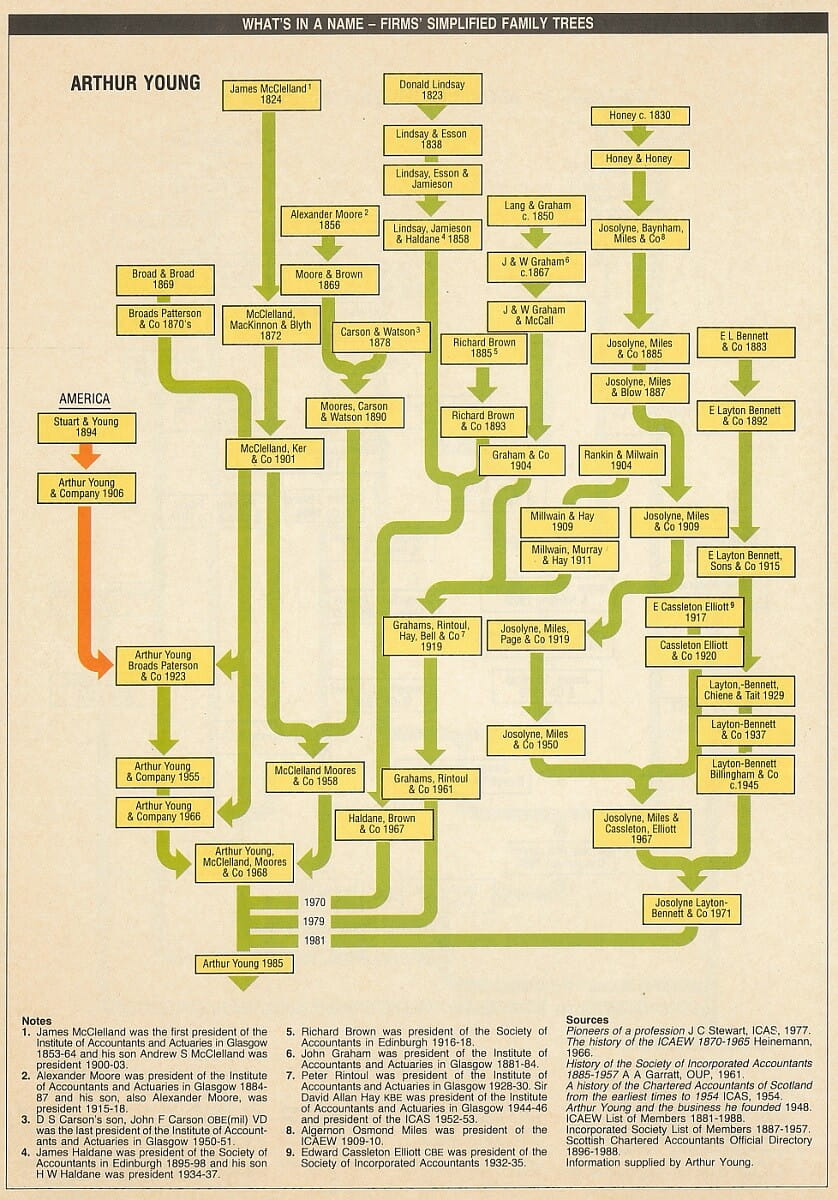Family tree

Amendments
Broads Paterson & Co 1870s not Broads Patterson & Co 1870s
McClelland, Moores & Co 1958 not McClelland Moores & Co 1958
Milwain & Hay 1909 not Millwain & Hay 1909
Milwain, Murray & Hay 1911 not Millwain, Murray & Hay 1911
Layton-Bennett, Chiene & Tait 1929 not Layton,-Bennett, Cheine & Tait 1929
Layton-Bennett, Billingham & Co c 1945 not Layton-Bennett Billingham & Co c 1945
Josolyne, Miles & Casselton Elliott 1967 not Josolyne, Miles & Casselton, Elliott 1967
Sources: Garrett not Garratt
The early history of Lindsay, Jamieson & Haldane is: Donald Lindsay 1818; Lindsay & Esson 1838; Lindsay, Esson & Jamieson 1855; and Lindsay & Jamieson 1856 ('Anatomy of a Scottish CA Practice: Lindsay, Jamieson & Haldane 1818-1918', Stephen P Walker, Accounting, Business and Financial History, Vol 3, No 2, 1993).
Newton & Co merged with Arthur Young & Company in 1965. The former firm's history is: Charles Baker c 1875; Baker & Gibson c 1876; Baker, Gibson & Co 1888; Gibson & Ashford 1895; and Newton & Co 1945. Arthur Henry Gibson was president of the ICAEW 1916-17. In 1894 Baker formed a separate practice, Charles Baker & Co, which amalgamated with Thomson McLintock & Co in 1921. (Accountancy, August 1965, p.807; Chartered Accountants in England and Wales: A Guide to Historical Records, Wendy Habgood (ed), Manchester University Press, 1994; ICAEW List of Members, 1881-1988; and information supplied by Arthur Young, 1989.)
Update
Arthur Young merged with Ernst & Whinney in September 1989 to form Ernst & Young (Accountancy, August 1989, p.12).
Ernst & Young announced that it had adopted EY as its global brand name on 1 July 2013.
What's in a name: Firms' simplified family trees
Between January and December 1989, accounting historian Peter Boys prepared a series of simplified family trees showing the development of the big accountancy firms of the day.
The original trees from 1989 have been reproduced here with a series of textual updates from Peter Boys which have taken the story forward to May 2005, the 125th anniversary of ICAEW. Since then, the staff of the ICAEW Library & Information Service have added notes on further changes that have taken place.
If you are aware of any further information which would add to or improve the accuracy of the family trees please let us know.
© Original trees are copyright of Accountancy Magazine and CCH.
© Updates are copyright of Peter Boys.
Can't find what you're looking for?
The ICAEW Library can give you the right information from trustworthy, professional sources that aren't freely available online. Contact us for expert help with your enquiries and research.